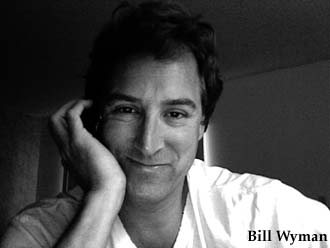Webbed Migration

Two years ago Steve Rhodes left his post as Chicago magazine media and political writer and launched The Beachwood Reporter, an online magazine chronicling all things Chicago (www.beachwoodreporter.com).
Last year longtime New York Daily News TV critic David Bianculli made the leap to the Web with Tvworthwatching.com, after the newspaper he’d been with for 14 years did not renew his contract. Former Chicago Reader music critic Bill Wyman also recently made the leap to the Web, with a music and media blog, Hitsville.org.
Wyman says the idea for his blog dates back to 2002, when he was an arts editor at National Public Radio. (Wyman was also arts editor at San Francisco Weekly and Salon.com and co-founded the rock ‘n’ roll talk show “Sound Opinions” with Sun-Times rock critic Jim DeRogatis in 1993. (He was not, however, a founding member of The Rolling Stones.)
“Many years ago, back on the radio show, we had Bob Guccione Jr. on – [former] editor of Spin,” Wyman explains. “I asked him why he didn’t cover the actual music business. ‘Oh, but we cover so much of the music business,’ he answered. To really savor the conversation, you have to envision him responding in his fake British accent. ‘No, you don’t,’ I’d said. ‘We do stuff all the time,’ he said, again with the accent. ‘Name one story,’ I said, and the silence was deafening.”
Wyman was a well-known music critic in Chicago, particularly in the early 1990s when his “Reader Hitsville” columns provoked letter wars with Chicago producer and Big Black/Shellac frontman Steve Albini over such topics as the relative merits of Liz Phair, Urge Overkill, and Smashing Pumpkins (these letters can be accessed; all of the Reader‘s archives are now open at www.chicagoreader.com/hitsville/pander.html).
Wyman’s new blog covers everything from the future of file-sharing to the demise of No Depression to Maxim‘s review of a Black Crowes record the critic hadn’t even heard in its entirety.
“The vaporization of the music industry is marvelous to watch,” says Wyman. “Now we get to see if the TV and movie industry learns from the mistakes.
“There’s the age-old complaints about financial exploitation of bands, which are often justified, but the vast majority of that is just the workings of the biz, and the rights the band signs away to get the advance. To turn Michael Kinsley’s dictum about politics upside down, the real scandal is not what’s legal – it’s what’s illegal. Labels don’t pay the bands the royalties they are entitled to. Up until recently, almost every song a radio station played was paid for by a record company. R. Kelly – it’s amazing he’s walking around a free man. There’s three very well-documented child-porn or child-sex charges against him, and he’s allowed to tour – to charge young girls money to be in the same room with him. What do people think goes on after an R. Kelly concert? It’s amazing.”
Rhodes’ clever and well-written Beachwood Reporter boasts regular contributors that cover everything from music to politics (they’ve even produced a few parody songs that have aired on the radio).
But its centerpiece is Rhodes’ daily front-page segment, “The Papers,” an incisive roundup of the newspapers’ top stories.
Rhodes said he started The Beachwood Reporter out of frustration with print media’s inability to embrace the new technology – and the demise of his popular online column, “Pressbox.”
“I felt like a revolution was going on and I was missing it,” he says.”To me the Internet is the most exciting thing to come along for journalism in a really long time. The print world has always been threatened by the Internet and defensive about it. I never really understood that. For me the Internet is a place where we can push journalism even further. It offers so many opportunities to do better reporting and better journalism, and you get that instant feedback from your readers.”
Sadly, none of these sites are overflowing with advertising. Yet.
At the same time, more journalists are losing their jobs as media organizations consolidate and “streamline” their holdings. Most seem to have been looking the other way when the Internet came to life.
“I think the Reader is a great example of getting caught flat-footed and not understanding the changes and not being innovative and not making the transition soon enough to the Web,” says Rhodes. “Now they’re kind of figuring it out. But I think it’s too late.
“Today I was reading a Tribune editorial dissing the New York Times story about John McCain, and reading it online,” he continues. “There was no link to the New York Times story that their story was about. They can’t even do basic linking. This says to me there’s a long way to go.”
BUT WAIT, THERE’S MORE: On April 7th, Chicago-based Pitchfork Media, which Rhodes calls “probably the most influential music site on the planet,” will launch its own online music TV channel, Pitchfork.tv. Described in press materials as “a visual extension of the music coverage Pitchfork has provided for more than a decade,” it will air everything from obscure indie music videos to full-length concerts and documentaries to bootleg videos. They promise high-resolution, on-demand features. “Now that the technology is here, we’re finally able to do it the way that people who really care about music have always wanted to see it done.”
Cara Jepsen’s weblog, No Sleep Til Mysore, dates back to 2003 and is at Mysore.blogspot. com.
– Cara Jepsen









